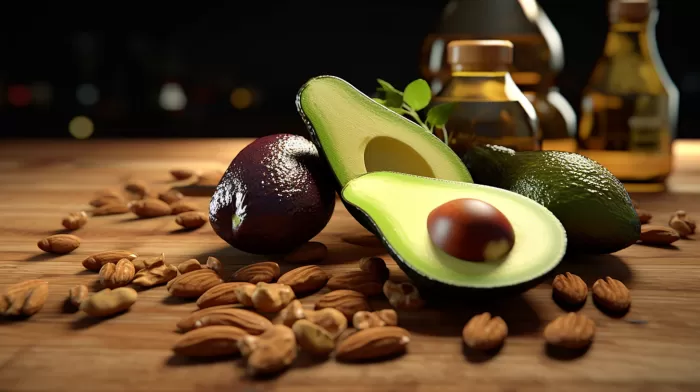You’ve likely already encountered the health wonders of omega-3 and omega-6 – the essential polyunsaturated fats that our body needs to function properly. But it’s time to introduce you to another unsaturated fat that holds remarkable health benefits – omega-9.
Omega-9 Health Benefits
Omega-9s are monounsaturated fats that help enhance heart health, and oleic acid, an omega-9, is a significant contributor to these benefits. Many healthy foods, including olives and nuts, contain oleic acid that provides heart-boosting advantages.
Clinical trials show the powerful impact of oleic acid derived from olive oil, as it can help prevent heart arrhythmias. Canadian researchers discovered that oleic acid and monounsaturated fatty acids in nuts may defend against coronary heart disease, especially in individuals with type 2 diabetes. In a study that involved over 100 participants, the researchers found that consuming nuts encourages these healthy fatty acids to enter our bloodstream, where they subsequently help our arteries operate normally.
Moreover, omega-9s have been found to strengthen our immune system and alleviate inflammation, highlighting their extensive potential health benefits.
Dietary Sources of Oleic Acid
Some of the healthiest sources of oleic acid include avocados, nuts, and lard (you read that right – lard!). However, it’s essential to avoid processed vegetable oils, such as canola oil, even though they are high in oleic acid. The reason being that these oils primarily come from genetically modified plants designed to possess high levels of oleic acid unnaturally.
Since omega-9 and oleic acid are non-essential, there’s no need to supplement these in your diet. Instead, simply integrate natural food sources containing these elements to reap their health advantages.
Nuts: A Superfood for the Heart
Several different types of nuts are incredible sources of oleic acid and can help maintain heart health. Some of these nuts are:
- Almonds: Rich in monounsaturated fats, almonds can help lower bad cholesterol (LDL) and lower the risk for heart disease. Furthermore, almonds contain vitamin E, which is excellent for skin and hair health.
-
Pecans: With a high amount of oleic acid, pecans aid in lowering cholesterol levels and assist in weight loss. They also have a healthy content of dietary fiber that helps maintain digestive health.
-
Hazelnuts: These power-packed nuts are full of healthy fats, mainly oleic acid, which can help reduce the risk of heart disease. Hazelnuts also contain manganese, essential for bone health, and various vitamins and minerals that benefit our overall health.
-
Brazil Nuts: Brazil nuts are rich in oleic acid and are brimming with selenium, which is crucial for preventing cell damage caused by free radicals.
-
Cashews: Cashews have plenty of oleic acid and can help lower bad cholesterol levels, promoting heart health. Additionally, they have high levels of magnesium, which is vital for bone and muscle health, as well as for keeping blood pressure in check.
Omega-9 Health Benefits Beyond the Heart
Although omega-9s are largely known for their heart health advantages, they offer additional benefits as well:
- Skin Health: Oleic acid can help soothe skin irritation and assist in reducing skin redness. Its moisturizing properties can also support healthy skin tone by repairing the skin’s outer barrier.
-
Brain Health: Studies have suggested that consuming oleic acid-rich nuts can lower the risk of Alzheimer’s disease development.
-
Mood Booster: Some research indicates that oleic acid may alleviate symptoms of anxiety and depression, but more studies are needed to confirm these findings.
-
Arthritis Relief: Omega-9 oleic acid can help alleviate joint inflammation and reduce symptoms of arthritis, allowing for greater comfort and increased mobility.
How to Easily Add Omega-9-Rich Foods to Your Diet
The following are just a few simple ideas to include omega-9-rich foods in your diet:
- Swap butter or margarine for olive oil when cooking vegetables or making salad dressings.
-
Use avocado as a spread on toast or sandwiches instead of butter or mayonnaise.
-
Snack on a handful of oleic acid-rich nuts or seeds throughout the day.
-
Incorporate olives in your salads or as a topping on cooked dishes.
In conclusion, omega-9 fatty acids, with oleic acid being the star component, lend significant health benefits, particularly to heart health. Including natural foods rich in oleic acid can bolster your immune system, enhance heart function, and even reduce inflammation, so why not give them a try? Besides, there’s no need for supplementation, as incorporating these foods in your everyday diet will suffice.



